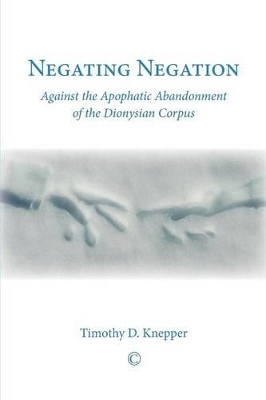
Negating Negation
Against the Apophatic Abandonment of the Dionysian Corpus
Seiten
2014
James Clarke & Co Ltd (Verlag)
978-0-227-17455-5 (ISBN)
James Clarke & Co Ltd (Verlag)
978-0-227-17455-5 (ISBN)
- Titel nicht im Sortiment
- Artikel merken
A closely reasoned analysis of the works of Pseudo-Dionysius the Areopagite, demonstrating that they do not, as is so often claimed, support an apophatic understanding of the divine.
'Negating Negation' critically examines key concepts in the corpus of Pseudo-Dionysius the Areopagite: divine names and perceptible symbols; removal and negation; hierarchy and hierurgy; ineffability and incomprehensibility. In each case it argues that the Dionysian corpus does not negate all things of an absolutely ineffable God; rather, it negates few things of a God that is effable in important ways. Dionysian divine names are not inadequate metaphors or impotent attributes but transcendent divine causes. Divine names are not therefore flatly negated of God but removed as ordinary properties to be revealed as divine causes.
It is concluded that since the Dionysian corpus does not abandon all things to apophasis, it cannot be called to testify on behalf of (post)modern projects in religious pluralism and anti-ontotheology. Quite the contrary, the Dionysian corpus gives reason for suspicion of such projects, especially when they relativize or metaphorize religious belief and practice in the name of absolute ineffability.
'Negating Negation' critically examines key concepts in the corpus of Pseudo-Dionysius the Areopagite: divine names and perceptible symbols; removal and negation; hierarchy and hierurgy; ineffability and incomprehensibility. In each case it argues that the Dionysian corpus does not negate all things of an absolutely ineffable God; rather, it negates few things of a God that is effable in important ways. Dionysian divine names are not inadequate metaphors or impotent attributes but transcendent divine causes. Divine names are not therefore flatly negated of God but removed as ordinary properties to be revealed as divine causes.
It is concluded that since the Dionysian corpus does not abandon all things to apophasis, it cannot be called to testify on behalf of (post)modern projects in religious pluralism and anti-ontotheology. Quite the contrary, the Dionysian corpus gives reason for suspicion of such projects, especially when they relativize or metaphorize religious belief and practice in the name of absolute ineffability.
Timothy Knepper is Associate Professor of Philosophy at Drake University, where he chairs the Department of Philosophy and Religion and directs The Comparison Project.
List of Tables
Preface
Introduction
1 The Divine Names Are Not Names
2 Negation Does Not Negate
3 Ranks Are Not Bypassed; Rites Are Not Negated
4 The Ineffable God Is Not Ineffable
Conclusion
Bibliography
Index
| Erscheint lt. Verlag | 25.9.2014 |
|---|---|
| Verlagsort | Cambridge |
| Sprache | englisch |
| Maße | 153 x 229 mm |
| Gewicht | 261 g |
| Themenwelt | Geisteswissenschaften ► Religion / Theologie |
| ISBN-10 | 0-227-17455-0 / 0227174550 |
| ISBN-13 | 978-0-227-17455-5 / 9780227174555 |
| Zustand | Neuware |
| Haben Sie eine Frage zum Produkt? |
Mehr entdecken
aus dem Bereich
aus dem Bereich
die Essenz meiner Lehre
Buch | Hardcover (2023)
Verlag Herder
CHF 51,90
eine Philosophie der besten Jahre
Buch | Hardcover (2024)
Carl Hanser (Verlag)
CHF 34,95


